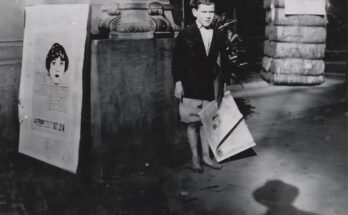Kazimierz Jędrzejowski was born on 12 July 1924 in the village of Osiek, Poland, into a humble peasant family. His childhood was marked by simplicity and hard work, and like many children of his background, he completed only primary school by the outbreak of World War II in 1939. Despite his young age, the war would thrust him into unimaginable circumstances and would shape the course of his short but courageous life. He came of age during one of the darkest periods in Poland’s history, as the country was ravaged by the dual forces of Nazi Germany and the Soviet Union.
During the German occupation, Kazimierz was forcibly deported to the Third Reich for labor—part of a broader Nazi effort to exploit the Polish population for the war economy. However, just one week into his forced labor in Germany, he made a bold and defiant decision: he escaped. Kazimierz believed that working for the Nazi regime was degrading for any Polish man, and his sense of national pride and personal dignity refused to allow him to participate in the system of oppression. His escape was perilous, but it showed the kind of fearless resolve that would characterize the rest of his life.
Returning to occupied Poland, he went into hiding in several places, including his native Osiek, nearby Malec, and the Cieszyn Silesia region. Despite the immense danger, Kazimierz refused to remain passive. He became involved with the Polish resistance movement, joining the Peasant Battalions (Bataliony Chłopskie)—an underground organization dedicated to fighting against the Nazi occupation. His role was particularly daring: he worked as a courier, secretly transporting information, messages, and aid to prisoners held in the Auschwitz concentration camp. This work was crucial to maintaining contact between the outside world and those trapped in the camp.
As the resistance in the area around Oświęcim (Auschwitz) grew, so too did the risk. After a partial exposure of the Peasant Battalions’ operations, Kazimierz’s leadership abilities were recognized, and he was appointed commander of the local unit. However, it was during this period that his luck ran out. In a twist of tragic misfortune, he was arrested not during an operation, but by sheer chance by the German gendarmerie. The exact circumstances of his arrest remain unclear, but his capture marked the beginning of a brutal ordeal.
He was first held in Osiek, then in Bielsko, before being transferred to the prison in Mysłowice. There, Kazimierz was tortured as the Gestapo tried to extract information from him about the resistance. Despite the torture, he maintained his silence and protected his comrades. Eventually, he was transferred to the Auschwitz concentration camp, where the Gestapo convened a summary court—a sham legal proceeding that took place in Block 11, known as the “Death Block.” This court, operating without due process, sentenced Kazimierz to death.
On 26 May 1944, at the age of 19, Kazimierz Jędrzejowski was executed by shooting in Auschwitz. His death was meant to instill fear, but instead, his legacy became one of inspiration and sacrifice. Before his transfer from Mysłowice to Auschwitz, he managed to write a final letter—words that stand as a testament to his courage and devotion to his country. In that letter, he expressed gratitude to his loved ones, sorrow for the life he would never live, and love for his mother. He accepted his fate with dignity and faith, writing:
“We are united by a common fate and a common goal, which is the Homeland… I accept it with calm because I know why.”
Kazimierz Jędrzejowski’s story is that of a young man who refused to be broken by tyranny. He stood against oppression, fought for freedom, and ultimately gave his life for his people. His memory, preserved through records, resistance history, and his final letter, continues to symbolize the strength and sacrifice of Poland’s wartime generation. His name may not be widely known, but his bravery echoes through history as one of the many silent heroes who gave everything for the dream of a free homeland.


